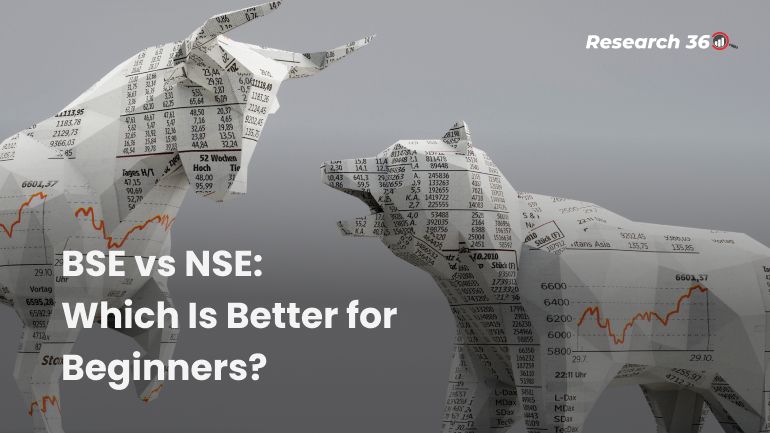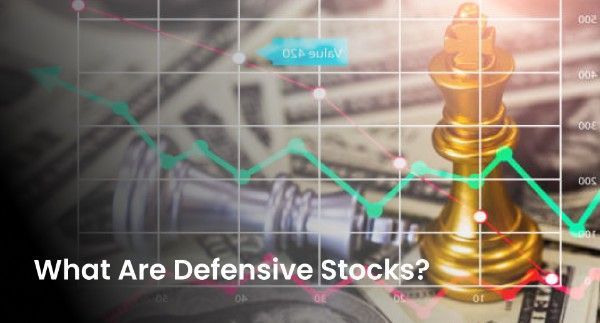BSE vs NSE: Which is Better for Beginners?

As a trader or investor who is new to the financial markets, you may be wondering which is the better exchange to trade on: the BSE or the NSE. Find out how the NSE vs BSE comparison looks.
India has two major stock exchanges — namely, the National Stock Exchange (NSE) and the Bombay Stock Exchange (BSE). Various financial instruments like stocks, options, futures and more are traded on these two primary exchanges. However, if you are a beginner in the markets or if you are not aware of the differences between the NSE and the BSE, you may be unsure of which exchange to choose.
This article, which delves into the NSE vs BSE comparison, can help you make an informed decision. Let us take a closer look at these two stock exchanges, how they are similar and different, and which of the two is more popular among traders and investors.
An Overview of the NSE and the BSE
Both of India’s major stock exchanges have a rich history and impressive growth trajectory. Let us explore these platforms further.
Bombay Stock Exchange (BSE)
Despite its massive popularity among traders today, the BSE had humble beginnings. It was established in 1875, making it the oldest popular stock exchange in India and Asia. Over the past few decades, the exchange has kept pace with evolving trader requirements and has diversified its offerings to include a wide range of financial instruments — including equity, debt instruments, mutual funds, currencies and derivatives. It also offers various platforms like the BSE SME (India’s largest SME platform) and the BSE StAR MF (the country’s largest online mutual fund platform).
National Stock Exchange (NSE)
The NSE, established in 1992, is owned by a group of banks, insurance companies and other financial institutions. It was set up with the aim of making trading in India more transparent and accessible, with anyone who met the required financial conditions being allowed to trade. In addition to democratising trading, the NSE also pioneered electronic trading in India. Due to the exchange’s consistent efforts to upgrade its offerings and keep pace with investor requirements, it recently emerged as the largest derivatives exchange in the world (in terms of number of derivative contracts traded).
NSE vs BSE: The Similarities
Before we venture into the differences between the NSE and the BSE, let us examine how the two exchanges are similar to one another.
Firstly, both exchanges play a crucial role in facilitating stock trading and investment in India. They each provide a platform for companies to list their shares and allow investors and traders to buy and sell securities. Additionally, both the NSE and the BSE contribute significantly to the Indian economy by enabling capital formation and fostering economic growth. They provide liquidity to the market, which is essential for efficient price discovery and trading.
The two exchanges also operate within the regulatory framework set by the Securities and Exchange Board of India (SEBI). This ensures transparency, fairness and investor protection in the trading process. Furthermore, both the NSE and the BSE offer a wide range of investment options, including equities, derivatives and mutual funds. They also provide various indices, such as the Nifty 50 and Sensex, which serve as benchmarks for the Indian stock market.
NSE vs BSE: The Key Differences
Now that you have seen how the two stock exchanges are similar in many ways, let us decode the differences between the NSE and the BSE. The table below compares the two main stock exchanges in India.
Aspect | National Stock Exchange (NSE) | Bombay Stock Exchange (BSE) |
|---|---|---|
Year established | 1992 | 1875 |
Benchmark index | Nifty 50 | S&P BSE Sensex |
Number of companies in the benchmark | 50 | 30 |
Technology used | National Exchange for Automated Trading (NEAT) system | BSE Online Trading (BOLT) system |
Number of companies listed | Over 2,000 companies | Over 5,000 companies |
Global ranking | 8th largest exchange (as of 2024) | 7th largest exchange (as of 2024) |
Introduction of electronic trading | From inception in 1992 | From 1995 |
Trading volume | Generally higher | Generally lower |
Financial instruments traded and trading facilities available | Equity stocks, equity derivatives, commodity derivatives, currency derivatives, mutual funds, exchange-traded funds (ETFs), trading via the Security Lending & Borrowing Scheme, corporate bonds and Offer for Sale (OFS) | Equity stocks, equity derivatives, commodity derivatives, currency derivatives, mutual funds, exchange-traded funds (ETFs), corporate bonds and Offer for Sale (OFS) |
Market capitalisation (as of May 2024) | Rs. 415.90 trillion | Rs. 424.60 trillion |
Liquidity | Generally higher liquidity | Generally lower liquidity |
NSE vs BSE: Which is Better for Investors and Traders?
Broadly, trading on the National Stock Exchange is not vastly different from trading on the Bombay Stock Exchange. However, for a few key reasons, the NSE has emerged as the more popular platform among many new-age traders. These reasons include the following:
Technology-Based Trading
The NSE's fully electronic trading systems, like the NEAT (National Exchange for Automated Trading) platform, offer faster and more efficient trading solutions compared to the BSE's hybrid model. This technology-driven approach attracts traders seeking quick order execution and minimal manual intervention.
A Wide Range of Trading Products
The National Stock Exchange provides a diverse range of trading products, including equities, derivatives, debt instruments and ETFs. This variety allows investors to create diversified portfolios and implement various trading strategies, appealing to both retail and institutional traders.
Liquidity and Transparency
Another reason for the National Stock Exchange’s popularity in the NSE vs BSE debate is that it has typically higher liquidity and trading volumes compared to BSE. This makes it easier for traders to buy and sell securities at competitive prices. The exchange also maintains high levels of transparency and provides traders with reliable market information.
Efficient Trading Mechanisms
With various efficient trading mechanisms designed to ensure fair and efficient price discovery, the NSE may have an upper hand in this context. Measures like market-wide circuit breakers to counter volatility coupled with a mix of tools like market orders and limit orders help traders execute trades at desired prices and enhance the trading experience.
Favourable Regulatory Environment
Both the NSE and the BSE operate under the regulatory framework set by SEBI. However, NSE's compliance standards and regulatory practices are often perceived as more stringent and investor-friendly. This can be more appealing to traders looking for a secure trading environment.
NSE vs BSE: Which Exchange Should You Choose?
The bottom line is that both the National Stock Exchange and the Bombay Stock Exchange are reputable exchanges with their own strengths. Choosing between them depends on your trading preferences and goals. However, both exchanges offer excellent trading opportunities and you can even benefit from tapping into arbitrage opportunities by trading on both platforms.
NSE is known for its advanced technology and higher liquidity, making it suitable for high-frequency traders and institutional investors. On the other hand, BSE, with its long-standing history and diversified index, attracts retail investors and those interested in value investing.
Conclusion
Irrespective of the exchange you prefer to trade on, you need to first open a trading and demat account. Motilal Oswal offers one of the best trading and demat accounts in the country, with a host of benefits ranging from a user-friendly interface to low brokerage charges.
What's more, you also get access to Motilal Oswal Research 360, a comprehensive market analysis platform for traders and investors in India. On Research 360, you can get crucial insights into stocks and other financial securities including derivatives. You can also conduct fundamental and technical analysis, get sector-wise updates and read through stock research reports. These features are crucial for making informed decisions and trading effectively on the NSE, the BSE or both the exchanges.

















